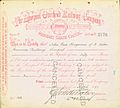Liverpool Overhead Railway facts for kids
The Liverpool Overhead Railway was a special train line in Liverpool that ran high above the ground, right along the Liverpool Docks. People in Liverpool often called it the Dockers' Umbrella because it provided shelter from the rain for the dock workers below. It started running in 1893 and used lightweight electric trains.
This railway was quite amazing for its time, achieving several "world firsts":
- It was the very first electric railway built high above the ground.
- It was the first to use automatic signals to control the trains.
- It was also the first to use electric colour light signals.
- It was the first to use electric multiple units, which are trains made of several carriages that can all be powered.
- It even had one of the first passenger escalators at a railway station!
It was also the second oldest electric underground or elevated railway system in the world, after the City and South London Railway which opened in 1890.
A Busy Railway
The Liverpool Overhead Railway was very important for people working at the docks and for moving goods around. In the early 1900s, its electric trains even connected with another railway, the Lancashire and Yorkshire Railway, allowing people to travel to places like Southport and Aintree. Special trains would still run to Aintree for horse races even after regular services stopped.
Why It Closed
Because it was a local railway, it was not taken over by the government in 1948 when many other railways in Britain were nationalised.
By 1955, a report showed that the railway's many bridges and structures needed a lot of expensive repairs. The company that ran the railway simply couldn't afford to fix them. So, sadly, the Liverpool Overhead Railway closed down at the end of 1956. Even though many people protested, the railway's structures were taken down the following year.
Images for kids
 | Toni Morrison |
 | Barack Obama |
 | Martin Luther King Jr. |
 | Ralph Bunche |









